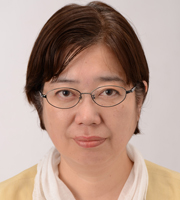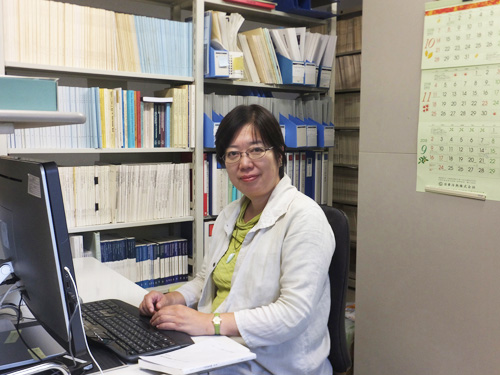
Mika Osuga
Assistant
Public Relations Manager; Editorial Assistant
Contact: mika@slav.hokudai.ac.jp
Mika Osuga

Education:
1985 B.A., Russian Literature, Hokkaido University
Field of Expertise:
I have been interested in Russian studies since my undergraduate years. I also spent a year in the US as an exchange student and five months at Pushkin Institute in Moscow. These international experiences have led me to SRC. Since taking up my position at SRC in 1990, I have been in charge of editing the following:
1. Publications on a regular basis
(1) a quarterly newsletter in Japanese, Slavic-Eurasian Research Center News (from no. 43),
(2) a yearly newsletter in English, Slavic-Eurasian Research Center News (from no. 1)
(3) SRC’s peer-reviewed international journal, Acta Slavica Iaponica (from no. 9)
(4) SRC’s peer-reviewed domestic journal, Suravu kenkyū “Slavic Studies” (from no. 38)
2. Occasional publications
(1) Slavic Eurasian Studies (from no. 1)
(2) Surabu-Yūrashia kenkyū hōkokushū, “Slavic-Eurasian Studies Occasional Papers” (from no. 1)
(3) Surabu-Yūrashia kenkyūsha meibo, “Directory of Scholars of Slavic-Eurasian Studies in Japan” (from the 3rd edition)
In addition, I have edited various project-based publications (for details see: http://src-h.slav.hokudai.ac.jp/rp/english/publications/index.html and http://src-h.slav.hokudai.ac.jp/publictn/indexe6.html).
As SRC is Japan’s national center for Slavic and Eurasian studies, I think it is very important to disseminate its activities as globally as possible via important and useful scholarly publications that can also serve to form a rich database and archive for SRC staff. Apart from the editorial work, I have been in charge of various foreign fellowship programs (including the International Training Program [2008–12]) and regularly make flyers and posters for scholarly events at SRC and beyond.
Since the time when I was assigned to my post, many things have changed. Particularly, the disappearance of the so-called Eastern Bloc has led SRC to redefine its role and raison d'etre. On the other hand, I have noticed that SRC is becoming far more global by tackling new research topics beyond the former Soviet Union and Eastern Europe. Nevertheless, I believe that the Slavic and Eurasian area is SRC’s unswerving academic core identity and that Russian studies in particular will remain of utmost importance in SRC’s activities.
COPYRIGHT(C) Slavic-Eurasian Research Center ALL RIGHTS RESERVED.